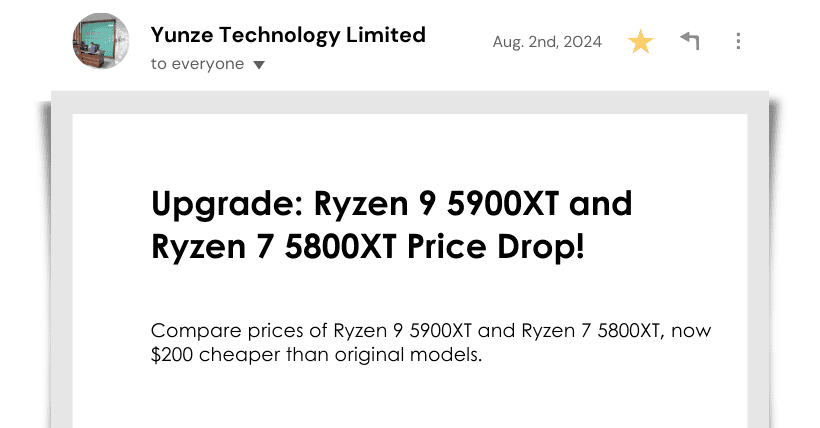Digital hardware enthusiasts are well aware that the launch of AMD’s Ryzen 9000 series processors has been delayed, from July 31 to August 8.
However, AMD’s recent official release plans for desktop processors include not only the Ryzen 9000 series but also two models from the Ryzen 5000XT series based on the AM4 platform: the Ryzen 9 5900XT and Ryzen 7 5800XT.
Following AMD’s typical strategy, these processors are likely higher-grade models with defects that have been downgraded, rather than newly developed flagship products. Consequently, expectations for their performance should be tempered.
Nevertheless, compared to other manufacturers, AMD tends to maintain relatively high standards in terms of performance and features, with minimal compromises from the original designs—an uncommon approach in the industry.
Here are the specifications for these two processors:
Ryzen 7 5800XT, released on July 31, utilizes TSMC’s 7nm technology, featuring 8 cores and 16 threads, with a base clock speed of 3.8 GHz and a boost clock speed of 4.8 GHz. It includes 4MB of L2 cache, 32MB of L3 cache, and operates at a power consumption of 105W.
Overall, the Ryzen 7 5800XT is nearly identical to the Ryzen 7 5800X, differing only in a slightly lower maximum clock speed of 0.1 GHz.
Ryzen 9 5900XT, also released on July 31, features 16 cores and 32 threads, with 6MB of L2 cache, 64MB of L3 cache, a base clock speed of 3.3 GHz, and a boost clock speed of 4.8 GHz, operating at 105W power consumption.
Compared to the Ryzen 9 5900X, the Ryzen 9 5900XT offers an advantage with 4 additional cores and 8 additional threads.
The critical factor for deciding whether these processors are worthwhile lies in their pricing and cost-effectiveness. The Ryzen 9 5900XT is priced at $349, significantly lower than the original Ryzen 9 5900X which was priced at $549, despite offering more cores and threads.
Similarly, the Ryzen 7 5800XT is priced at $249, also $200 less than its predecessor, the Ryzen 7 5800X, while maintaining nearly identical specifications.
In conclusion, AMD demonstrates considerable goodwill with competitive pricing. These processors are ideal for users looking to upgrade from lower-end Ryzen 3000 series processors without planning to switch platforms in the next few years. For users currently on higher-end Ryzen 3000 series processors, platform switching may be a more viable option.
Objectively, while these new processors may not be groundbreaking, AMD’s commitment to supporting the AM4 platform after 8 years is commendable and beneficial for existing users.
Source: VideoCardZ
Related:
- Troubleshoot Nvidia Causing Another Computer Blue Screen
- Are Supercomputers Only About Maximizing CPU Quantities?

Disclaimer:
- This channel does not make any representations or warranties regarding the availability, accuracy, timeliness, effectiveness, or completeness of any information posted. It hereby disclaims any liability or consequences arising from the use of the information.
- This channel is non-commercial and non-profit. The re-posted content does not signify endorsement of its views or responsibility for its authenticity. It does not intend to constitute any other guidance. This channel is not liable for any inaccuracies or errors in the re-posted or published information, directly or indirectly.
- Some data, materials, text, images, etc., used in this channel are sourced from the internet, and all reposts are duly credited to their sources. If you discover any work that infringes on your intellectual property rights or personal legal interests, please contact us, and we will promptly modify or remove it.



